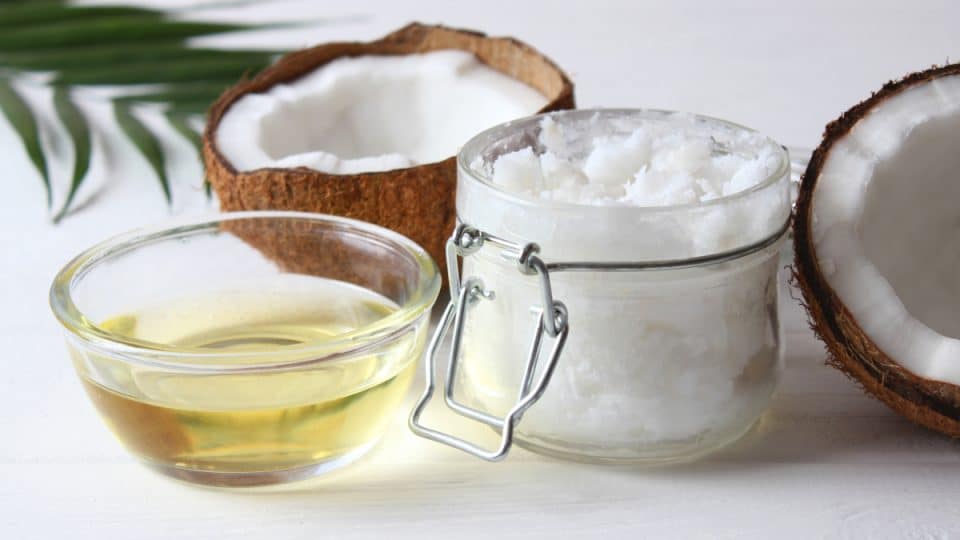- Not a substitute for professional veterinary help.
It’s a popular ingredient in natural remedies and skin care products for people, but is coconut oil good for dogs? Most vets think that nutrient-dense coconut oil can be a good addition to your dog’s diet in safe, small amounts, whether added to your dog’s food as a supplement or applied to the skin. Rich in fatty acids and healthy saturated fats, coconut oil is popularly thought to do the following:
- Make a dog’s coat extra shiny
- Relieve allergies and dry, itchy skin
- Help alleviate bad breath
- Boost energy levels
- Protect against fleas and ticks
- Soothe arthritis and joint issues
In this guide, we’ll discuss the safety and potential benefits of coconut oil for dogs. We spoke to Dr. Nell Ostermeier, DVM, a veterinarian and advisor at Figo Pet Insurance, to determine how to safely incorporate coconut oil into your dog’s diet or grooming routine.
Is Coconut Oil Safe for Dogs?
Coconut oil is not toxic to dogs. It’s simply the edible oil extracted from mature coconuts and is rich in medium-chain triglycerides (MCTs). Because MCTs are broken down quickly by the body and tend to be used as fuel instead of stored as fat, they’re often described as a healthier option than the long-chain triglycerides (LCTs) that make up most of the fat in animal products.
Though not toxic, the question of whether coconut oil is good for dogs is a little murky. Research supporting its purported benefits is limited as well.
Dr. Ostermeier notes that coconut oil is generally safe for dogs but should be introduced gradually into their diet. “It is high in fat,” she says, “so it can trigger stomach upset and pancreatitis in some dogs.” As with any changes to your dog’s diet, it’s best to start with small amounts and watch for side effects.
Coconut oil can be offered orally or administered topically. To give your dog coconut orally, you can offer it directly, mix it with their food, or prioritize it as an ingredient in healthy dog treats. Topically, coconut oil can be applied to the skin, coat, or paws.
If your vet approves of giving your dog coconut oil, opt for unrefined coconut oil, also known as virgin coconut oil. Cold-pressed coconut oil may be preferable in some cases, as it tends to have a milder scent and flavor. Again, start with a small amount to make sure your dog tolerates it well, and slowly work up to the amount recommended by your veterinarian.
What Does Coconut Oil Do for Dogs?
For both pets and people, coconut oil has an array of anecdotal benefits for everything from digestion to immunity. Many of these benefits are linked to the oil’s high MCT content. The MCTs in coconut oil were purported to boost weight loss, improve energy levels, reduce insulin resistance, and even protect against seizures and cognitive decline.
However, evidence is mixed on whether the science truly supports these claims. Anecdotal evidence provides some support, but more study is needed to draw any strong conclusions about the health benefits of coconut oil for humans. Research involving dogs is particularly limited, though anecdotal evidence suggests similar effects.
Let’s take a closer look at some of the purported benefits.
Skin and coat improvements
Rich in fatty acids, coconut oil may help moisturize your dog’s skin and give their coat some extra shine. When applied topically, coconut oil may help alleviate dry, itchy skin and could help improve the inflammatory symptoms of skin allergies.
Fuel for the brain and body
Once they pass through the digestive tract, the MCTs in coconut oil travel to the liver where they’re used as a quick-acting source of energy. Offered orally, coconut oil could give your dog an energy boost. There is some evidence to suggest that coconut oil may support cognitive improvements, specifically in dogs with epilepsy.
Antimicrobial and antifungal effects
Coconut oil has antimicrobial, antifungal, and antiviral properties. When given orally, it may help combat the bacteria that cause bad breath. Applied topically, coconut oil may help stop the spread of bacterial skin infections or yeast infections.
Though coconut oil may help with minor bacterial skin problems, it should not be used as an alternative to antibiotic medications for dogs.
Reduced gut inflammation
Because it’s rich in MCTs, coconut oil is more easily digestible than some fats, and it may improve the absorption of fat-soluble vitamins. Coconut oil is purported to reduce gut inflammation and has been anecdotally associated with improvements in digestive disorders like inflammatory bowel disease (IBD).
Recent research calls some of these claims into question. A 2018 study published in Nutrients showed that the lauric acid in coconut oil—which accounts for about half of its MCT content—is more inflammatory than other saturated fatty acids. After this study was published, the American Kennel Club (AKC) updated its stance on coconut oil, cautioning dog parents against using it without veterinary approval.
Potential Risks and Side Effects
Every dog is different, and coconut oil may do more harm than good in some cases. “Due to the high saturated fat content,” says Dr. Ostermeier, “some dogs will not tolerate coconut oil.” Giving your dog too much coconut oil or introducing it into their diet too fast could upset their stomach and cause digestive issues like diarrhea.
Some dogs have a reduced tolerance for dietary fats, including dogs with pancreatitis or IBD. In these cases, your veterinarian may recommend against giving your dog coconut oil.
Negative reactions aside, coconut oil is a calorie-dense food—one tablespoon contains about 100 calories. Depending on your dog’s size, health status, and activity level, the extra calories from coconut oil could contribute to a calorie surplus. Follow your vet’s dosage recommendations and monitor your dog for weight gain.
How To Use Coconut Oil for Dogs
Dr. Ostermeier notes that there is no standardized dose of coconut oil that has been proven safe. The right dose depends on your dog’s size, the method of administration, and the desired benefit. Work with your vet to determine how much coconut oil is appropriate for your dog and how best to incorporate it into their diet or grooming routine.
Here are some of the most common ways to use coconut oil for dogs:
- Offer it to your dog directly—some dogs enjoy the taste and will lick it right off the spoon.
- Hide your dog’s medication in a small spoonful of coconut oil.
- Warm the coconut oil to soften it and mix it into your dog’s regular food.
- Make homemade dog treats using coconut oil and other dog-safe ingredients.
- Massage a little coconut oil into your dog’s paws or patches of dry skin.
- Apply a little coconut oil to soothe minor wounds like insect bites.
- Mix water and coconut oil in a spray bottle to use as a detangler or conditioner.
When applying coconut oil topically, there are a few things to keep in mind. First, it’s okay if your dog licks the coconut oil off. You can leave coconut oil on your dog’s fur as long as you’re following your vet’s dosing directions and monitoring for negative reactions. Talk to your vet if your dog’s skin becomes irritated or symptoms like dryness or itching get worse.
Second, be prepared for the coconut oil to rub off on furniture and flooring. Massing it thoroughly into your dog’s skin or paws can help ensure most of it gets absorbed so you don’t end up with greasy paw prints all over the house or stains on your furniture.
How much to give your dog
If you’re going to give your dog coconut oil orally, think of it as a treat. Treats should account for no more than 10 percent of your dog’s daily intake—the rest should come from a nutritionally balanced dog food product.
When giving coconut oil as an oral supplement, Dr. Ostermeier recommends starting with one teaspoon per day for small dogs and two teaspoons for larger dogs. To minimize the risk of stomach upset, consider dividing your dog’s daily dose in half and offering the coconut oil along with a meal.
When using coconut oil topically, apply a very small amount to a patch of visible skin with minimal fur. Check the area after an hour or two. If there’s no visible evidence of a negative skin reaction, proceed with your veterinarian’s recommended application.
Further Reading
- The Human Foods That Are Actually Good for Dogs
- Coconut Whipped Cream is Basically Dairy-Free Puppuccinos for Dogs
- 5 Healthy Oils for Dogs to Give Your Dog’s Coat (and Brain) a Boost
- Can Dogs Be Vegetarian? What About Vegan?
- Is Homemade Dog Food Safe? What To Know About Cooking for Your Pet





